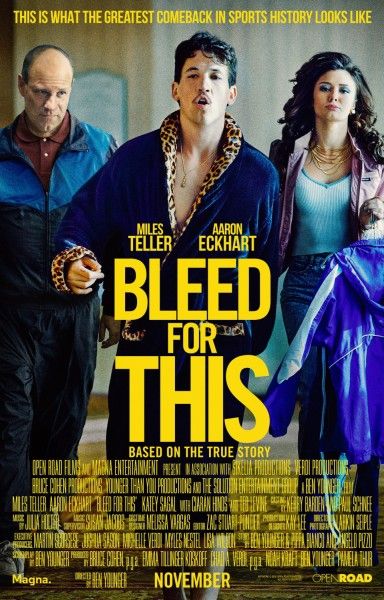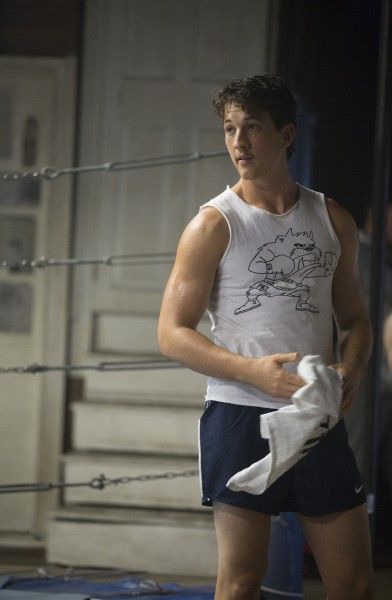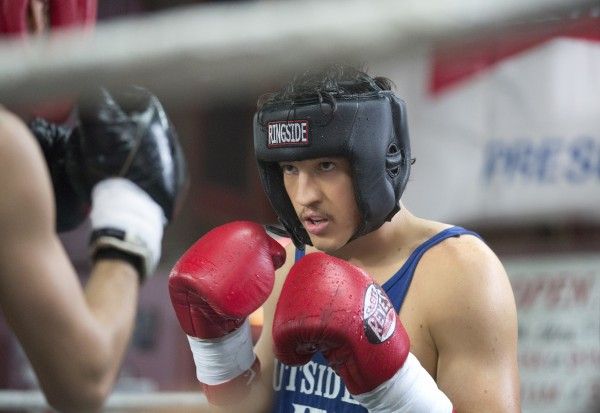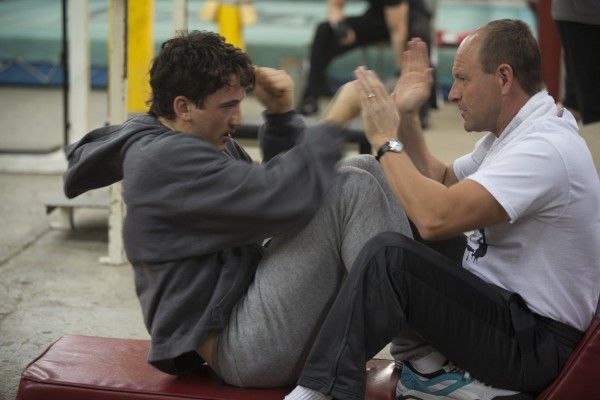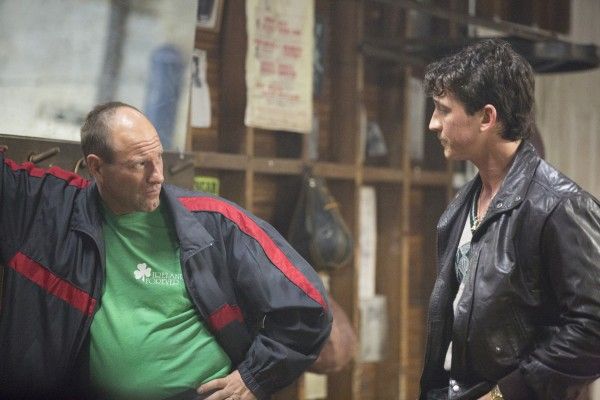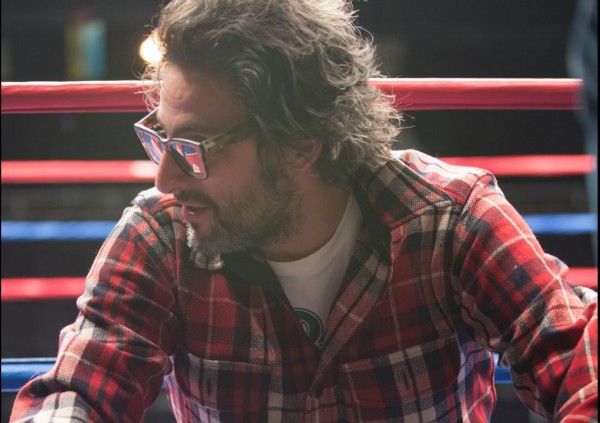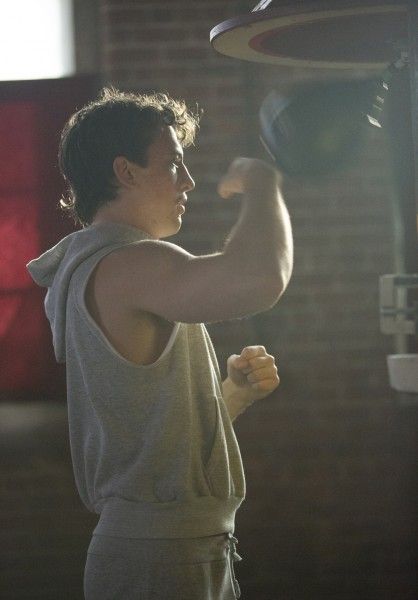With writer-director Ben Younger’s (Boiler Room) boxing drama Bleed for This now in theaters, I recently sat down with producer Bruce Cohen for an exclusive interview. If you’re not familiar with this incredible true story, after winning two world title fights and shooting to stardom, Vinny “The Pazmanian Devil” Pazienza (played by Miles Teller) was in a brutal car wreck that left him with a broken neck and was told that he may never walk again. Against all odds and doctor’s orders, renowned trainer Kevin Rooney (played by Aaron Eckhart) agrees to help Vinny return to the ring, just a year after the accident, for what could be the last fight of his life. Bleed for This also stars Katey Sagal and Ciarán Hinds as Pazienza’s parents.
During the interview, Cohen talked about how he made the transition from being an assistant director on films like The Color Purple and Batteries Not Included to being a producer, how he got involved on Bleed for This, why they felt like they had to shoot in Rhode Island and at some of the real locations, changes in the editing room, and more. In addition, with Cohen involved in a number of upcoming projects, I got updates on the Richard Pryor movie, the J.D. Salinger movie Rebel in the Rye starring Nicholas Hoult, Kevin Spacey, and Sarah Paulson, the status of the Houdini movie, ABC’s When We Rise (which is about the history of the LGBT movement from 1974 to today through the eyes of three real people), and more.
Check out what he had to say below.
COLLIDER: So I have to jump backwards, and you got started as an AD and you worked on The Color Purple and Batteries Not Included and all these Amblin movies back in the day and then you transitioned to being a producer. How the F do you make that jump from being an AD to being a producer?
BRUCE COHEN: I kind of joke with myself that you shouldn’t be able to be a creative producer if you weren’t a first AD. Because it is such fantastic training for really understanding what everyone does, and how the movie actually gets made. You have to know if you’re the first you’re kind of the set general, you’re at the director's right hand, you know everything about how a director puts a movie together, you know everything about how a movie gets made. So it is true that ADs do not get a chance to get a chance to create or produce, almost never, because it’s whole separate thing. Most creative producers you have to come up on the development side, you work with agents, you work with writers, you’re in the office and then the AD’s are on the set. But it’s a real shame because part of –No decision in producing can be made correctly unless you have all the creative information you need but you also have all the budget and scheduling information you need. So it’s really worked out well for me and for the directors I worked with that I had the AD training, because it is unusual for a creative producer.
Sure, but I’m curious how you make the leap?
COHEN: What happened was the first movie I worked on as a DGA trainee was The Color Purple where I met Steven Spielberg and my producing god and goddess Kathy [Kathleen] Kennedy and Frank Marshall. I ended up ADing a lot of movies for Amblin over the next eight years of so and on those projects I started seeing –I didn’t even know what a producer did really but I started seeing what producing was and I really loved what Kathy and Frank did. I thought their job of producing and the way they did it was spectacular and I really wanted to start doing what they did and the three of them gave me a chance to start doing that. After I was a trainee they let me second assistant director and then they promoted me to first assistant director. The first movie I was they first AD on was Frank’s first directing movie Arachnophobia, and then I was the first AD on Hook for Spielberg, and then Frank and Kathy went to go off to do Frank’s second movie Alive and they let me produce for the first time, I was a co-producer. Then Kathy and Steven brought me The Flintstones and said, “Would you like to be the lead creator producer on this movie?” and I thought they had lost their minds. I was like, “What are you talking about?” they’re like, “We believe in you and we think you’re ready. We’ll get you a great support team.” This amazing guy, Colin Wilson, who’s now one of the top-line producers in the business, he was my co-producer and knew sort of the line stuff. So The Flintstones was my first film. Literally the answer to your question is literally, Steven Spielberg, Kathy Kennedy, Frank Marshall gave me the opportunity to go from first AD to creative producer.
So basically how often do you send them thank you cards?
COHEN: Every time I see them I send them thank you cards. Although when I partnered with Dan Jinks, he and I brought American Beauty as a spec script to DreamWorks, so Spielberg did have the occasion to also send me a thank you card after we won him his first best picture Oscar at that studio.
Right, that’s funny. What do you remember though from those early days on Amblin? Because Batteries Not Included is like one of those thing I grew up with, like Hook, all those kind of movies.
COHEN: Well, it was Camelot. I mean, Amblin was this incredible period in filmmaking where it was this company run by Spielberg with Kathy and Frank who were making these A+ quality family movies that the world loved. The Back to the Future series and the Indiana Jones series and the movies you mentioned; so it was a family rally, it was a lot of the same people doing the movies over and over. You know, if you were a director of photography or costume designer or first AD you know once you came in and they liked you, you could keep doing movie, after movie, after movie. It was an amazing place to work and it really taught me to strive for quality first always and to strive to be classy first always and how you treat everyone. But it also taught me once I started producing –Steven and Kathy and Frank believe that the creative producer’s job is to service the vision of the director, to stay within schedule and budget, and to get the studio what they need, but you work for the director to get their vision on the screen. That’s not how everyone approaches producing, but it is certainly how directors like you to approach producing. So it’s worked very well for me when I’ve subsequently gotten to work for Sam Mendes and Tim Burton, and Gus Van Sant and David O’Russell and Ben Younger, that that was how I was brought up is that my job is to help you make the movie you want to make.
Jumping into Bleed For This, an incredible story, I’m from New England.
COHEN: Had you heard of him?
Yes.
COHEN: Because most non-boxing fans don’t know him.
But I also grew up in New England so it’s a whole different thing.
COHEN: Well everyone in Rhode Island has heard of him for sure.
My family is in Rhode Island too. But I’m just curious, was this one those project where once you got involved it sort of moved pretty quickly or was it like, “Oh my god to move this boulder up the mountain to get it made was challenging”?
COHEN: Well, it was both. Actually, it moved pretty quickly but it was a huge mountain to climb. [Martin] Scorsese had come on as executive producer because Chad Verdi who was the first producer who optioned the material and who had known Vinny knows Marty, and Emma Tillinger Koskoff came on to produce, as she does for Marty. But then, happily for me, Marty and Emma had Vinyl going at HBO and they were going right into Silence finally after all these years of Marty wanting to shoot Silence. So Marty, and Emma, and Chad, and Ben realized that Emma couldn’t be on the set and they needed a producer who could actually get the movie up and running, so they brought the script to me and I loved the script. By the time I finished reading it I knew I had produce the film. So then we had to find financing, cast the movie, and pull it all together but we did that in about a year or so, so that’s relatively quick compared to how long these things can take.
Talk a little about the balance. Here’s the thing, you’re telling a real story but you’re also making a movie. So talk a little about balancing fact and fiction in the movie?
COHEN: Well, we got lucky because the real story was pretty incredible and we were able to stick pretty closely to the facts. I mean, Ben talks about it a lot is the one thing we had to sort of do was actually pull stuff back from the real story. I mean, you see Vinny and his parents in the video clips at the end and if our characters had really talked like that in that larger than life Rhode Island accents, it would almost have been too much. Vinny in the real story he started lifting weights in his basement five days after he had the halo put on, if we had done that in a movie you would have literally walked out of the theater because you would have been so concerned and disturbed. So if you look at the movie we don’t really specify how long but it feels like a month at least before he lifts. So we sort of, which was one of the things that really worked and feels authentic about the movie, is rather than having to embellish the true story we actually had to pull the true story back a little bit to bring it to the screen.
It’s so funny because I heard the same stuff talking to everyone for Hacksaw Ridge, that what he did in real life is so crazy that they couldn’t put it in the movie because people would just be, “No.” They would think they were just making it up. Talk a little bit about what were some of the things you guys felt had to be in the film, like some of the real examples of stuff that he did or certain moments.
COHEN: Well, we felt that we had to shoot in Rhode Island, part of that was budget and schedule. There was no way on the budget we had we could’ve made anything look remotely like what it was really like unless we had really been there. We went to the Providence Civic Center where the delay fight had really been and begged them. We could have never afforded an actual sports arena but we’re like, “This is where the fight happened, we’re shooting here, this is Vinny, it’s Rhode Island. We need to shoot this fight in The Providence Civic Center and you need to make it affordable for us to come here,” and they did. Then we went to the community and we said, “We need extras people need to come, need to stay all day and be at the fight. We can’t pay you we can invite you to the Rhode Island premier,” which they’re going to get to come to. We did a show of hands there and all day long we had about 3,000 extras come for free, which was amazing. There was at least 100 of them that had been at the real fight, that many years before in The Providence Civic Center. We were scouting hospitals, this we didn’t even know, we were scouting hospitals in Providence to find the hospital that we were gonna use for when he has the accident where he’s brought and then he’s released out that side door when he’s in the wheelchair. We were scouting that particular hospital and they said, “You do realize this is the real hospital where he came, right?” and we we’re like, “No, actually we didn’t but now that we know this is where we’ll shoot.” So the Italian men’s club in the basement where Angelo is playing cards when they get the news that his son has been in the car accident, that was the social club that Angelo belonged to and he was there in that exact same room playing cards when the news was found on that exact same TV. Stuff like that is worth its weight in gold to really give texture and authenticity to the film.
It also adds a lot of production design for minimal cost.
COHEN: Absolutely. That room literally was ready to shoot. In fact, well, what was funny is there was this homemade collage of great Italian sports heroes that was there in the room that we we’re like, “Oh my god that’s the most perfect set dressing ever.” But it had Vinny of course on it so we couldn’t use it because Vinny wouldn’t have been on the poster yet in the real story, so I don’t think we filmed that but it was a great piece of set dressing.
You guys obviously finished the film, you’re showing it to friends and family. What do you learn from those early screening or even early test screening that impacted the finished film?
COHEN: I don’t know if it surprised us as much, but we just learned sort of the central story that is Vinny’s journey. The director’s cut would have more family scenes of the dinner table, which was beautiful stuff and I think those scenes really –The actors getting to play those scenes really made them feel like they were a family and gave the film authenticity. But we didn’t have time for all those scenes, there’s actually a really good one that’s on the DVD extras. They didn’t make the final cut because you were really following Vinny’s journey and that’s what we wanted. In some way it’s sort of two different movies, so it was figuring out that structure because you’re following this guy who is a womanizing drinking gambling studly boxer and I love that film, that’s a great film, but then once the accident hits it turn into a very, very different movie. One of the things that’s nice before the marketing comes in is that your audience has seen the movie and they don’t know the story and they don’t know what’s gonna happen so you get a different surprising reaction to it.
How long was the first cut versus the finished film?
COHEN: I don’t remember the length of the whole cut but I do remember that –and Ben will certainly talk about this. He had structured the script so that the accident was halfway through, and we realized in the film in the editing room that that wasn’t really gonna work and that the accident had to be at the end of act one. Because in some sense the film really starts, this film, lots of boxing movies have been made and are sort of a whole genre to themselves and different boxing movies have different ebbs and flows. But for our movie, what sets this movie apart is the movie starts really when he has the accident because that’s what the films going to be about so that was the main structural shift we had to make. We had to condense everything up until the accident happens so it felt like the first act of the film.
I watched it last night and when we is getting the screws taken out the entire theater where I saw it –including myself– were just cringing. So what is it like watching and knowing that scenes coming, are you sort of watching the audience getting ready to see them all just start squirming?
COHEN: Well, it’s a pleasurable scene for filmmakers because people are incredibly squeamish and uncomfortable and in fact a woman did faint in Toronto and reached out to Ben on Instagram confirming that she was loving the film, had never fainted before, fainted in that scene, had to go to the hospital and was incredibly bummed because she didn’t get to see the end of the movie; but she’s fine. But also people find it really funny and it’s good –Kind of the magic of movie-making is that when people are scared and anxious, the laugh reflex comes out as well, that’s like human nature. So those lines, the “Lefty loosey, righty tighty” they get a huge laugh because people need to laugh. Then the doctor saying, “Fuck me” at the end gets a huge laugh, that’s really the biggest laugh of the film. Because you just had this incredibly intense scene and that’s what you’re feeling. So yeah it’s exciting but it’s also the part of why I think that scene works is it isn’t a gratuitous scene, it’s about the themes of Vinny’s life, it’s about how when he set his mind to something he will accomplish it. If you’re really following it thematically, it probably gives away that he’s gonna win the final fight because this is a guy who achieves what he sets out to achieve against all odds. Also, it doesn’t cross the line. There’s a couple points in that scene where the neck shot could be so horrifying or disgusting that it could cause people to leave the theater or barf, or faint but it doesn’t, it toes that line of it’s watchable. What’s good for the audience who hasn’t seen the movie before is they don’t know it could go beyond at any moment but it actually doesn’t.
Moving on to some other things that I want to talk about. You’re attached to the Richard Pryor movie. This is a movie that to me I can’t understand how a Richard Pryor film has not been made yet so is this gonna be the one that goes?
COHEN: I hope so. It’s one of the most brilliant scripts Bill Condon did the initial draft and then Lee Daniels has done the rewrite. And unfortunately it’s hard to make the economics work in this landscape. It’s not a cheap movie, it’s period, it’s wide scope and it’s getting a cast together that gives you enough foreign value to make the movies that is the challenge. The Weinstein Company and Lee and myself and Mike Epps who’s been attached for a while to play Richard Pryor, all of us as badly as we wanna make the movie we even feel a little higher obligation to the subject matter to do it right. So we’re not gonna do it until we can do it the right way and I hope it comes together soon cause it really is a project that needs to be made.
Well one of the things I found about biopics is that sometimes when they try to take on, and I don’t know what you’re movie is, but sometimes when they try to take on too much it becomes difficult in two hour span or two and a half hours. Is your version of the story is it a chunk of his life, is it huge, is it just a few years?
COHEN: It’s most of his life.
So you guys are going ambitious.
COHEN: We are going ambitious and that is the pitfall of biopics, I completely agree. This script has solved that. The emotional arc of this script is so overpoweringly beautiful that it’s just one of those scripts where it’s like on what planet has this not gotten made yet. But it will, it’s going to, some way, somehow it’s going to get made.
Sometimes with people's lives they sort of are afraid to tackle when they really had problems and Richard really had problems, like drugs, he had issues, but he was gifted performer. So are you guys tackling it full on in the script or is it one of these things where you’re gonna….
COHEN: No, we’re tackling it full on. The script is as dark, and raw, and sad, and scary in some ways but ultimately inspiring as well as a script can be. I wouldn’t say that’s really part of the problem because the financiers really they’re looking at the value of the film, they're not concerned per se if something’s really dark but we didn’t get any help from that. If it was a romantic comedy it would be easier to get our funding together. You know if you look at Lee Daniel's work, if you look at my work and certainly if you look at Harvey’s work, you know these are filmmakers who do not pull punches and that’s certainly the case here.
I have to ask, one of the things that a lot of friends I know in the industry have started working with Netflix or Amazon for alternate funding and I know some people who are working with Netflix who got final cut and budgets and the whole thing. So has that even come up, working with Netflix or Amazon?
COHEN: Yeah, it has. We’re certainly exploring all options and the thing about Netflix and Amazon is a) they have financing and b) their creative is so strong. I mean, they are really trying to do beautiful work. So anytime you have new players who are doing great stuff there’s a lot of excitement and you want to do stuff with them, absolutely.
I’m just wondering purely because they have the worldwide market now, so I’m just curious if that’s even an option.
COHEN: Yeah, that’s the complicated part with Amazon and Netflix, and they’re a little bit different business models, but it’s figuring out the theatrical part of it and how it all works because their main business is streaming worldwide. Not just on Pryor but in general it’s switching over now, but Netflix is a new player in town and their doing all this great work and people want to work with Netflix but if you’ve always sold you’ve movie foreign to other territories it’s really hard for Netflix to come in and help you because they can launch you on their platform but not in certain countries. I mean, you can but it’s hard, it’s called the worldwide web, so they're looking for projects where you haven’t sold foreign already. But traditionally the independent film model was selling foreign, so we’re in that sort of transition period where producers have this other option to go to before they start trying to sell their territories.
Sure, it’s just interesting dynamic you know the marketplace is just shifting. So Rebel in the Rye, how’s that looking?
COHEN: Rebel in the Rye I’m very excited about. Incredible cast, Nicholas Hoult, Kevin Spacey, Sarah Paulson, Victor Garber, Lucy Boynton, and Zoey Deutch, all of whom deliver phenomenal performances. I mean, Danny Strong is clearly a director he did a terrific job with the material which he wrote, and with them. So we’re just trying to figure out now, we’re just starting sound and music. So we’re figuring out next year what’s our path, are we doing festivals? When are we releasing? But hopefully next year it will come out to the world.
I’m very curious, obviously [J.D.] Salinger it’s a subject everyone’s curious about. So can you talk a little bit about the project, it’s sort of like Bleed for This, balancing fact and fiction. What kind of story are you telling? What can audiences expect?
COHEN: I mean, there’s some similarities in that it’s surprising, maybe not surprising. Especially now a lot of people don’t know the Salinger story. I think thirty or forty years ago more their might have been a larger awareness of all of his issues and what happened to him after he wrote Catcher in the Rye and the other brilliant things he wrote and then he was isolated and disappeared and no one could find him. He didn’t write anything and he didn’t publish ever again, but a lot of that has been lost now, so in a way that’s good you can sort of approach things with a fresh palette. But Danny wanted to while taking the usual fact to fiction license that you have to because it’s not a documentary –Someone said something really interesting the other day they said, “Even documentaries aren’t what happened,” you know there’s a huge jump between life and then putting something in a two hour movie, even if it’s a documentary. So we obviously had to make those, but Danny wanted to stay very true to the story and so we really tried to make it as accurate as possible and within the two hour time frame. One of the premises of the film, which we truly feel is the real story, is that his war experience where he landed on D-Day and then marched through Germany and he was involved in the liberating of the camps was incredibly traumatic. He really had severe PTSD, which of course didn’t exist then and wasn’t diagnosed then. So the soldiers were told, “Everything you’re experiencing is normal and just tough it out and it will fix itself,” which needless to say we know now it doesn’t. So his war experience and the PTSD that followed really affected his writing of Catcher and Rye, which he wrote during the war, and sort of everything that came after it. So that’s kind of one of the lenses through which we’re telling our story.
Will we see any footage like a trailer or a teaser or it is it still to be determined the direction you’re going like when it’s released will determine when we first see footage?
COHEN: Correct. We don’t have anything planned. We’ll probably get a distributor first before we do any marketing material.
Is there a chance that we’re gonna see it at Sundance?
COHEN: It’s hard to tell yet whether that will happen or not, but maybe.
I’m just wondering because if you’re in the mindset that we’re at the end of October beginning of November, festivals are in January, we’re like right at the threshold, you know what I mean.
COHEN: I think Sundance this year third week of November is when they’ll be announcing who’s gonna be there.
Yeah, I would say you’re movie is a really strong possibility, just my gut feeling. You’re attached two projects, 1) the story of Houdini, who is like one of those people who it’s like, again, how the F has this not been told. I know you’re attached to a Houdini project is these any movement on that?
COHEN: Yes, there’s nothing I can talk about at the moment but there is some movement on that. It’s at Lionsgate Frank Marshall and I are producing it. It’s based on a non-fiction book that posits very convincingly that Houdini did do some work for the US government as a spy in the years leading up to WWI. It makes a lot of sense because he had huge access across Europe to heads of state and to governments there because he was such a huge star. I mean, he was one of the biggest worldwide entertainment personalities of the time. Houdini, our version, is fiction it’s not meant to be based on a true story but it takes off from the what if Houdini really was a spy working for the US government, and that’s what our movies about. It’s a terrific script written by Noah Oppenheim, the great screenwriter who now runs the Today Show and who also is the screenwriter of Jackie, which is how I got involved. I read Jackie, thought it was amazing, met Noah, and that’s how I got involved with Houdini and brought Frank on. So I am hoping, we are all hoping it gets made and there is some activity right now so let’s see if it comes together.
I also wonder with the avenues of TV right now and everyone looking for content that the idea of Houdini in a period piece going around the world and doing stuff like you’re pitching in an eight to ten episode TV show also sounds like could be something. Are am I wrong?
COHEN: No, absolutely. Ideally we want to start with the film first but yeah a spin off TV series is a great idea.
I know you have the ABC show When We Rise. So where are you at in editing that what can you tell people?
COHEN: I am so deeply proud and excited about When We Rise it’s an eight hour limited series, it’s the history of the LGBT movement from 1974 to today through the eyes of three real people, four really, grassroots San Francisco. So it’s set mostly in San Francisco and it’s mostly about these four characters, between the four of them they’ve been involved in pretty much everything that has happened in the LGBT movement over all those decades. So the fact that it’s getting made is amazing, the fact that it’s on ABC is so exciting. Gus Van Sant is directing the first two hours, who ever thought you’d see Gus Van Sant on ABC? It’s gonna be on hopefully in February, we are almost done. I was at the mix for hours five and six yesterday. It’s electrifying. We’re really, really excited for the world to see it.
If I’m not mistaken you told me at TIFF that it pushes the boundaries of what you might expect from ABC.
COHEN: That’s absolutely the hope, certainly is that if you showed it to people blind they’d expect, assume and be quite sure that it on premium cable. So that’s one of the reasons why we’re really excited that it’s on broadcast. Why it was so important to [Dustin] Lance [Black] that it be on one of the broadcast networks is that we want to get the message out. You know, there’s a huge different having to pay a subscription for something versus actually free, you turn it on in your living room and anyone in America red state or blue state can watch it, and that’s why we’re so excited that it’s going to be on ABC.
It’s interesting that the story takes place from then until now. Is that tricky to balance that jump in time?
COHEN: It was a massive production challenge. The work for the production design and the costumes and the actors was completely extraordinary. There are six different time periods, the first two hours take place pretty much in the same time and the last two hours take place pretty much in 2011 and then there’s four different time period in between. So it’s really epic and I think it will really be exciting to watch it. It’s hopefully gonna air two hours a night over four nights. So the history is just gonna come cascading in front of you as it goes.
Obviously you’re very busy with all these things. What did I miss what else is coming up?
COHEN: Well, as far as in the can Bleed For This, Rebel in Rye and When We Rise are the three, and as far as what’s coming up next Houdini and Pryor are certainly high on my list. I don’t know yet what he next thing that actually goes is but I’ve got a lot of stuff I’m excited about so it’s hard to just –That’s the producer’s job, you develop a lot of stuff and then hopefully something will shoot next year and we will be talking again.
Exactly, let me say thanks.


